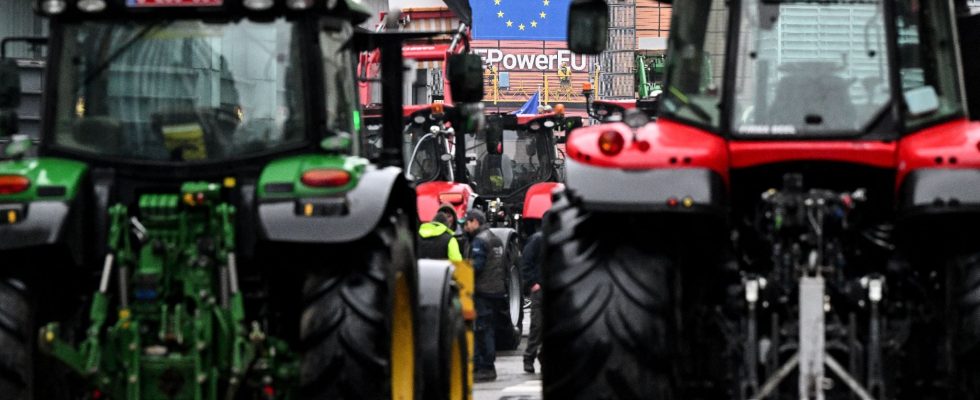In the aisles of the Agricultural Show, Marc Fesneau must not have believed his ears when the Head of State took the floor to present new measures, in an electric atmosphere. In front of the unions and to everyone’s surprise, Emmanuel Macron announced, Saturday February 24, his intention to establish “floor prices which will protect agricultural income”. Just a month ago, the Minister of Agriculture described this measure emanating from La France insoumise and which was the subject of a text rejected by the National Assembly as “demagogic”.
“It has nothing to do with the proposal from La France insoumise, which wants to transform our farmers into civil servants and nationalize mass distribution,” assured Gabriel Attal on RTL on Tuesday February 27. The details of the project are still unclear and Bercy must soon launch “a project with agricultural organizations” on the issue, according to the Elysée, while the Prime Minister indicated that the government would “ensure that cost indicators of production that exists, they are in the law, […] can be the basis for constructing the price.
In an interview with L’Express, Jean-Luc Demarty, former director general of agriculture, then foreign trade of the European Commission, from 2000 to 2019, judges this system to be totally contrary to EU rules and unnecessary to an economic point of view. According to him, it is above all necessary to restore the competitiveness of French agriculture through a long-term strategic plan.
L’Express: Are you surprised that Emmanuel Macron is taking up this idea which has been rejected until now by the Ministry of Agriculture?
I am surprised. We feel the improvisation. I find that the Attal government has, until now, managed the end of the agricultural crisis rather well. But the catastrophe caused by the “real false” invitation of the Earth Uprisings generated a certain excitement at the Agricultural Show and placed President Macron in a very difficult situation which pushed him to improvise in order to try to make it out.
Will this measure be applicable?
To begin with, it is grossly against all European rules. You cannot have an integrated agricultural policy, while having Member States which start to apply minimum prices. This has neither legal meaning nor economic interest. If you set a floor price, it will be calculated based on average production costs. If it’s low, it’s no use. If it’s high, it prevents high performers from expressing their competitiveness.
This system could not work. The head of state will realize this and will try to derive all this at the European level, but that will not be possible. The old common agricultural policy before 1992, which I spent thirty years of my life reforming, ensured price support at the level of production costs through public intervention and export aid. This was obviously unsustainable, because demand fell below supply and we ended up accumulating tens of millions of tonnes of public stocks, in milk powder, beef and of course cereals. This policy was running out of steam in the 1980s. With the first major reform of the common agricultural policy in 1992, we moved to a system of direct aid to farmers to compensate for the difference in production costs between the Union European and third countries.
The only way to apply a floor price in a legally correct way would be to return to this intervention system and set prices at a level equivalent to production costs. Very quickly, mountains of unsaleable public inventory would accumulate. There will certainly be no political majority in the EU to reinstate this kind of policy. Furthermore, the 40 billion euros in income support paid to EU farmers would be delegitimized.
How else can we ensure French food sovereignty? Should we go through Europe?
French food sovereignty is first and foremost the restoration of the competitiveness of French agriculture. It is a long-term policy. The causes are well identified: bureaucracy, the overtransposition of European standards which on the whole do not seem excessive to me, tax problems, the absolutely impossible deadlines for building the slightest livestock or methanization building. Furthermore, the average size of French farms is too small. On the contrary, we must take advantage of the exit of a certain number of farmers in the coming years to expand existing farms. Of just under 400,000 French farms, 25% are completely underwater because they are too small or poorly managed. We must help these farmers retire with dignity and expand their farms.
So we need a strategic plan?
We need a thoughtful plan, constructed and not improvised in five minutes, to restore the competitiveness of French agriculture over ten years. The problem is really Franco-French. The French agri-food trade balance is a surplus of around 8 billion euros which is stagnating, while that of the European Union has gone from 10 billion euros fifteen years ago to 70 billion euros. euros in 2023. France has become in deficit compared to the rest of the EU and has increased its surplus vis-à-vis the rest of the world, in particular thanks to free trade agreements.
.
